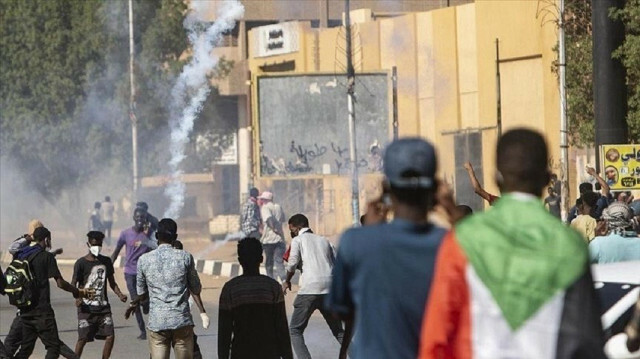
Protests across North African country demand restoration of civilian rule
At least four protesters were killed and hundreds injured demanding the restoration of civilian rule in Sudan, a doctors group said Friday.
At least four protesters were killed Thursday by live munition in Omdurman, the twin city of the capital Khartoum across the White Nile River, while 200 were injured, the Central Committee of the Sudanese Doctors said in a statement.
“Thursday's repression of the demonstrations is known as a full-fledged crime against humanity, as the authorities launched a fierce war against peaceful demonstrations,” the committee said.
It added: “We detected about 200 injuries during Thursday's demonstrations, including about 40 injuries from live bullets, some of which are critical.”
On Thursday, protest rallies took place in several areas in the capital Khartoum, Kasala, and Port Sudan in the country's east, as well as the northern city of Atbara, according to an Anadolu Agency correspondent on the ground.
Protesters called for democratic civilian rule and decried a recent political deal between the military and Prime Minister Abdalla Hamdok.
Internet services on Thursday were down in the capital and other areas prior to the demonstrations, as providers cut mobile services, with only landline connections remaining available.
On Wednesday, security authorities closed multiple bridges and overland routes, installing concrete barriers and barbed wire on roads leading to the presidential palace.
The calls for protest were made by the Sudanese Professionals Association, which rejected the deal signed last month and called for full civilian rule.
Sudan has been in turmoil since Oct. 25 when the Sudanese military dismissed Hamdok's transitional government and declared a state of emergency.
Hamdok, however, was reinstated on Nov. 21 under an agreement with army chief Abdel Fattah Al-Burhan in a move rejected by Sudanese political and civil forces as an "attempt to legitimize the coup."
Before the Oct. 25 military takeover, Sudan was administered by a sovereign council of military and civilian officials overseeing the transition period until elections in 2023 as part of a precarious power-sharing pact between the military and the Forces of Freedom and Change coalition.
Hello, the comments you share on our site are a valuable resource for other users. Please respect other users and different opinions. Do not use rude, offensive, derogatory, or discriminatory language.
The floor is all yours.








